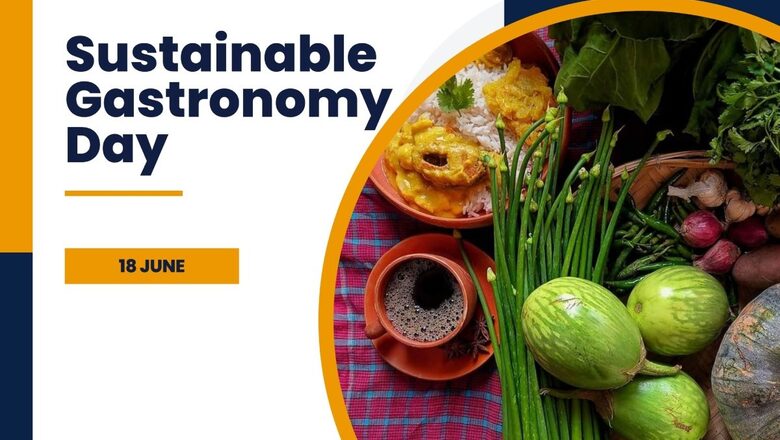
views
SUSTAINABLE GASTRONOMY DAY 2023: Sustainable Gastronomy Day which takes place on June 18 every year, highlights the important role that food plays in promoting sustainable development and the crucial choices about what we eat. According to the United Nations, gastronomy is sometimes called the art of food. It also refers to a style of cooking from a particular region.
Sustainability is the concept that ensures particular activity, like fishing or food preparation is carried out in a manner that reduces the waste of natural resources and can be maintained in the long term without impacting the environment or our well-being. By accepting sustainable practices, we can contribute to a greener future. The theme for this year’s celebrations is ‘Local Flavours, Preserving Global Heritage.’
Sustainable Gastronomy Day 2023: Significance
Sustainable gastronomy promotes practices that reduce the environmental impact of food production. By using organic farming methods, diminishing greenhouse gas emissions, preserving water, and protecting biodiversity, sustainable gastronomy helps to conserve ecosystems and reduce climate change. It also encourages the consumption of nutritious, fresh, and locally sourced ingredients. It also boosts a balanced diet rich in fruits, vegetables, whole grains, and plant-based proteins, providing improved public health and well-being.
Sustainable practices increase food security by making sure of the availability of nutritious food for all. Boosting sustainable farming techniques and supporting small-scale farmers strengthens local food systems, lessens dependence on imports, and improves flexibility against climate shocks and other disruptions.
It also celebrates cultural diversity by promoting traditional culinary practices and protecting local food heritage. It acknowledges the importance role of food in cultural identity and promotes the revitalization of traditional cooking techniques.
Sustainable Gastronomy Day 2023: 5 Sustainable Foods
- PulsesPulses like lentils, beans, and chickpeas are highly sustainable foods. They are also rich in protein, fiber, and various essential nutrients.
- SeaweedAlso known as macroalgae, seaweed is a versatile and highly sustainable food source. It is highly nutritious and offers a range of essential vitamins, minerals, and antioxidants. It is a rich source of iodine, iron, calcium, and vitamin K, among others.
- MushroomsMushrooms are not only a versatile ingredient but also a sustainable food option. They are nutrient-rich and provide multiple health benefits. They are also a good source of protein, fiber, vitamins, and minerals.
- Cereals and GrainsRice, wheat, corn, oats, and barley, are not only known for their high energy and nutrient density but also as sustainable food options. Whole grains, which include bran, germ, and endosperm, provide essential dietary fiber, vitamins, and minerals.
- Fruit and VegetablesFruits & vegetables are important components of sustainable food. They are rich in essential vitamins, minerals, and fiber that promote overall health.




















Comments
0 comment